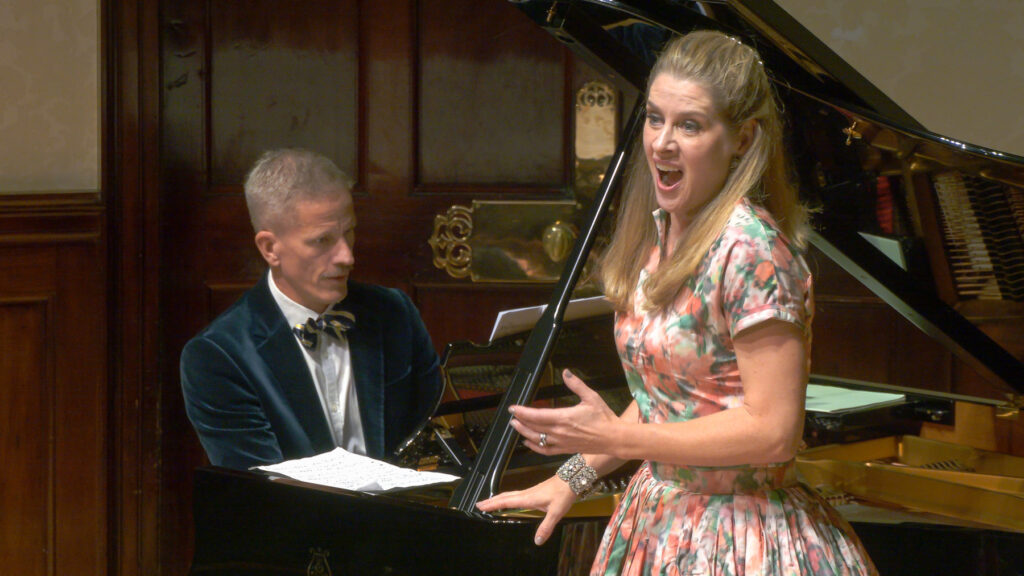A recital programme as inviting as this from the acclaimed Swedish soprano would surely have attracted a full house for her Wigmore recital. A pity then to see so many unclaimed seats for repertoire that was mostly standard issue. For those unfamiliar with this operatic heavyweight, Malin Byström secured rave reviews two years ago for her Salome and Tosca at Covent Garden and, earlier this year, found favour for her role in Strauss’ Capriccio at the Edinburgh International Festival. That she possesses a voice which can easily ride over an orchestra playing full tilt is not necessarily an advantage in the relatively modest space that is Wigmore Hall.
And judging by the generous decibels displayed throughout much of the evening, there were times when Byström may have imagined she was at the Royal Opera House grappling with a Wagnerian sized orchestra. French Mélodie does not need this degree of amplification, and certainly not when one is evoking rapture and moonlight by a composer renowned for his understated means of expression. Fauré’sClair de lune has never sounded so resolute, nor Notre amour so determined.
Matters improved in her offerings by the excessively self-critical Henri Duparc whose admittance to the great pantheon of French song writers is based on 16 solo songs and a single duet. Perhaps his modest output was influenced by his teacher César Franck who insisted his pupils must “write little but make it extremely good”. With their mixture of lyricism and dramatic recitation, the best of Duparc’s songs are mini masterpieces; little wonder Graham Johnson has referred to Duparc as a “Prince among French song composers”. The brooding melancholy of La vie antérieure came across well and the doom-laden quest of Le manoir de Rosemonde could have had no better gothic portrayal. Intense yearning was well caught in Chanson Triste, if again with its intensity heavily underlined, yet sumptuousness of tone filled the melting phrases of Extase, its Tristanesque rapture readily capturing the “exquisite death”. Shimmering languor occupied L’Invitation au voyage where Byström unlockedevery ounce of emotion, but her fulsome tone never quite summoned the song’s dreaming.

Byström’s ample tone is a little too generous for the nostalgia that is baked into Les chemins de l’amour, one of Poulenc’s most insouciant gifts to song repertoire. It was succeeded by the less familiar, but virtuosic L’été by Cécile Chaminade, whose songsonce graced the parlours and drawing rooms across two continents. Far from a cosy fireside Mélodie, L ‘été is a real showstopper, and once featured at the opening night of the 1930s Proms season. Its burst of birdsong and vocal acrobatics was delivered here with thrilling bravura.
After the interval Byström turned to Alban Berg for his Sieben frühe Lieder. If we didn’t quite hear veiled awe in ‘Nacht’, she poured her heart into these jewel-like songs, finding tenderness in the sighing phrases of ‘Schliflied’, a heady sensuousness in ‘Traumgekrönt’ and plenty of ardour in the ‘ecstatic dreams’ of ‘Liebesode’. Less familiar fare emerged in four of over 300 songs by Ture Rangström, one of several composers (including Alfvén, Berwald and Stenhammer) associated with a golden era of Swedish song during the early years of last century. Thanks to Elisabeth Söderström,Anne Sofie von Otter and Malin Byström this repertoire has steadilygained a foothold in the recital room. Languor and intimacy of expression left their mark in Pan and Bön till natten, while the bittersweet Den enda stunden drew perfumed tone, and the restlessness of Vingar i natten brought echoes of Schubert. Fine songs, just a pity this composer is so often overlooked.
Not so Kurt Weill whose reputation rests mainly on his works for the stage, from which songs such as ‘Mack the Knife’ (Threepenny Opera)and ‘Surabaya Johnny’ (Happy End) are justly famed. For Je ne t’aime pas Byström found a dark, smoky tone, freighted with passion. So too in the tango-infused Youkali, its cabaret atmosphere elusive, despite some idiomatic support from pianist Magnus Svensson, who throughout the evening was an involving and sensitive collaborator.
David Truslove
Malin Byström – soprano; Magnus Svensson – piano
Gabriel Fauré – Clair de lune Op. 46 No. 2, Notre amour Op. 23 No. 2 (c.1879); Henri Duparc – La vie antérieure, Le manoir de Rosemonde, Chanson triste, Extase, L’invitation au voyage; Pauline Viardot – Sérénade for solo piano; Francis Poulenc – Les chemins de l’amour; Cécile Chaminade – L’été; Alban Berg – 7 frühe Lieder – Nacht, Schilflied, Die Nachtigall, Traumgekrönt, Im Zimmer, Liebesode, Sommertage; Ture Rangström – Pan, Den enda stunden, Bön till natten, Vingar i natten; Kurt Weill – Je ne t’aime pas, Youkali
All photos: Swedish soprano Malin Byström performs with pianist Magnus Svensson at London’s Wigmore Hall on Monday 30 September, 2024. © The Wigmore Hall Trust